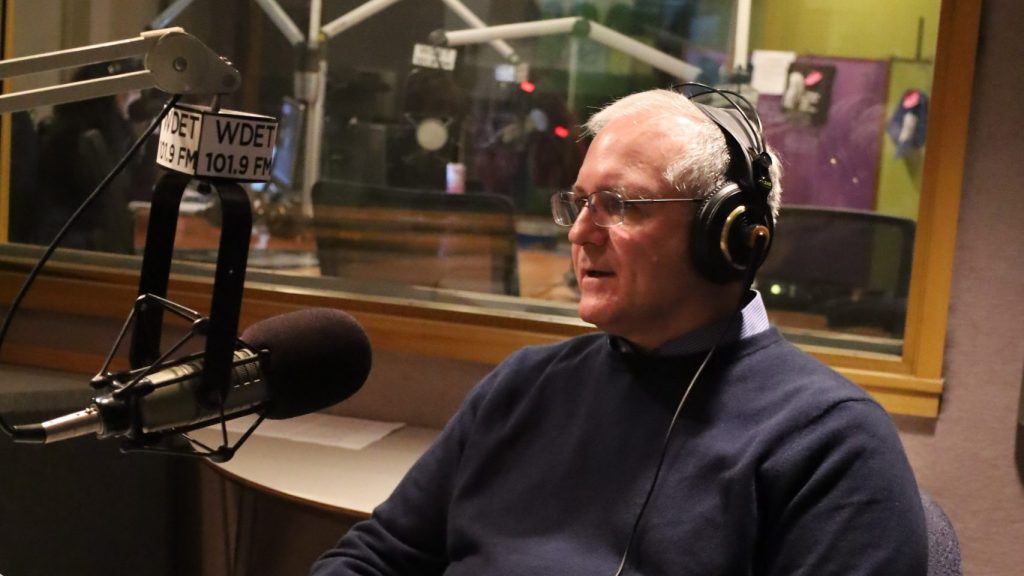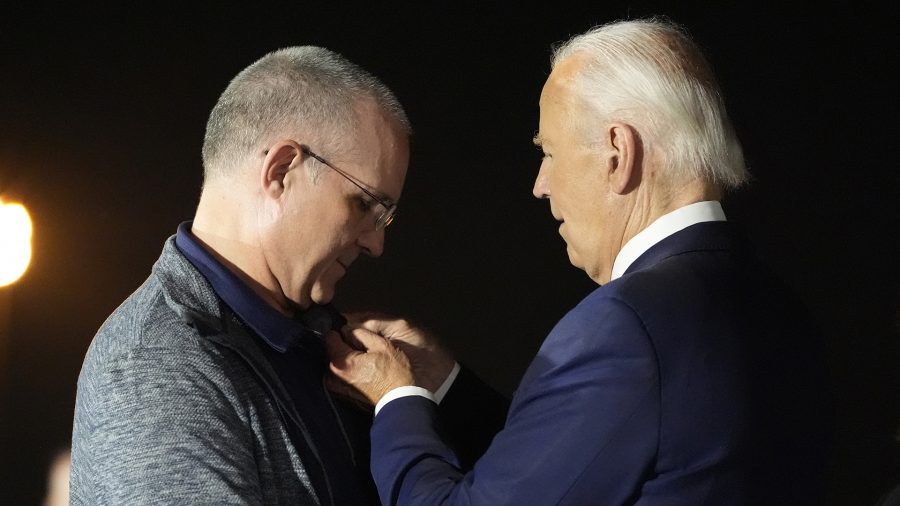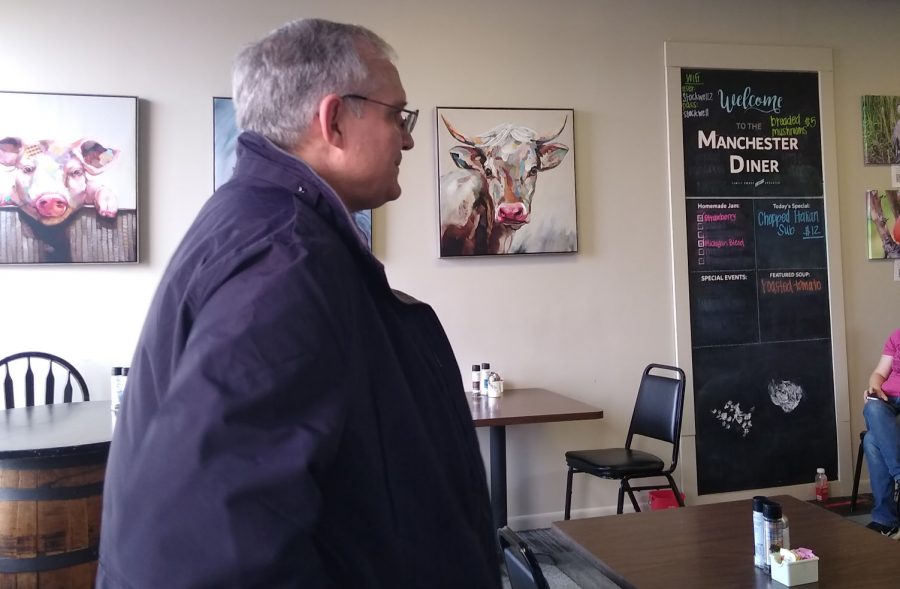Former Russian hostage Paul Whelan still feels trapped by Michigan red tape
Quinn Klinefelter March 27, 2025Whelan, who was wrongfully detained in a Russian labor camp for more than five years on false espionage charges, returned to the U.S. last August.

Former Russian hostage Paul Whelan speaks with Senior News Editor Quinn Klinefelter at WDET Studios.
Using hostages as bargaining chips remains a favorite tactic of some nations and terrorist groups.
Negotiating their release is often tricky.
It took seven countries cooperating last summer for the U.S. and Russia to complete the largest prisoner swap since the Cold War.
Among those exchanged was 55-year-old former U.S. Marine Paul Whelan.
But since returning home, the Michigan native says he’s still felt trapped.
Only this time it’s in a web of governmental bureaucracy.
The long-delayed return
Concerns about resuming life in the U.S. seemed very far away for Paul Whelan last August, when a swarm of media trained their cameras on the small plane delivering him home.
It had just touched down at Andrews Air Force Base near Washington, D.C. amid a small crowd where some had waited years for this moment.
Whelan was the first to emerge from the aircraft. Tall, light-haired, wearing glasses and the dirty clothing he had on when Russia first detained him years ago, which guards had stored away until now.
He steadied himself on the hand railings of the steps leading from the plane, weak from malnourishment after years in a Russian labor camp.
Then he snapped-off a crisp salute to the figure waiting for him.
It was then-President Joe Biden, who embraced Whelan. After several conversations between the two, in an impromptu moment, Biden removed his American flag lapel pin and handed it to the former U.S. Marine.
Announcers on CNN noted that Whelan waved to the crowd on the tarmac. And, they said, “America waved back.”

Imprisoned by the system
Whelan now says, in some ways, it was a wave goodbye.
“What we found is that once your home, you’re actually on your own. The attention turns on the next guy that’s still locked-up somewhere abroad,” he said.
Whelan had returned from a Russian labor camp, wrongfully detained for five years, seven months and five days on false espionage charges.
The government spent a few weeks checking his medical and psychological condition, then released him.
Whelan says he was not in great physical shape.
His former employer, BorgWarner, had dropped him as its director of global security after the first year he was detained by Russia.
That also meant losing his medical insurance at a crucial time for Whelan in the prison camp.
“I had a hernia that needed surgery and then I was unemployed. I didn’t have the means to pay for a private operation,” Whelan said, adding that Russia wouldn’t act until his case was dire. “I basically had to wait until I had to have emergency surgery.”
Back home in Michigan, Whelan needed some kind of immediate income.
But he found that since he had not had a job in Michigan recently, he did not qualify for unemployment.
“Because the laws were written so specifically, my situation falls outside the cookie cutter. I was working but I was working in a Russian labor camp. And apparently that doesn’t count,” he said.
A member of Congress had to contact Michigan’s Secretary of State just for Whelan to get a driver’s license and identification.
And being convicted of a crime in Russia, even a crime the U.S. government declared was bogus, created problems.
“When I applied for a renewal of my global entry card, which comes from Customs and Border patrol, I had a hard time with them,” Whelan said. “Because they kept focusing on the fact that, ‘You were arrested and you were imprisoned overseas.’ And I said, ‘Yeah and look at the pictures of the president meeting me at Andrews Air Force Base when I came back.
Strangest of all, he says, was when he tried to get full Medicaid coverage through the state.
“I had a letter back that said I didn’t qualify because I wasn’t a U.S. citizen. It makes you scratch your head, to be quite honest. How could somebody have sent that to me? But they did. And I said ‘You can just Google my name right now.’”
Whelan is actually a citizen of four countries.
He was born in Canada to parents who hailed from the U.K. and the Republic of Ireland. He moved to the U.S. as a child.
A law without funding
It’s not supposed to be that difficult for returning hostages.
Congress created the Robert Levinson Hostage Recovery and Hostage-Taking Accountability Act specifically to provide medical and other help to them and their families for five years after their release.
But it’s never been funded.
Michigan U.S. Rep. Haley Stevens says there’s a bipartisan effort to add that appropriation.
“We need to do that. That’s next phase. Someone like Paul Whelan, five and a half years taken from him, if he was wrongfully imprisoned in the United States he’d arguably get compensation. Paul Whelan right now is living off of a GoFundMe. And it’s unacceptable. And it’s wrong,” she said.
Stevens says the latest Defense reauthorization bill did include money to strengthen sanctions against countries who take hostages and help families who lobby for a loved one’s release.
Whelan helped lobby for those changes.
He says he’s also pressing for the Social Security Administration to cover retirement payments hostages lost while detained.
He’s talked with various government entities about the need for better communication among agencies dealing with wrongfully detained Americans.
Ironically, for someone falsely painted as an espionage agent, Whelan has even been a featured guest at the International Spy Museum in Washington, D.C.
He discussed his firsthand experience of dealing with Russian security forces and Moscow’s prison system.
Putting the puzzle pieces together
Paul Whelan scraped the last of his soup from a bowl on a modest table in the Manchester Diner, named for the small Michigan village about 60 miles away from Detroit.
Whelan lives there now with his elderly parents.
The former Marine said he’s contacted several organizations that help veterans.
But except for a bit of assistance from a Boston group affiliated with Harvard, the rest have turned him down because his captivity as a hostage was not related to his military service.
So Whelan said he is literally depending on the kindness of strangers in his community.

Auto dealers from the area offered him a leased vehicle.
Private practitioners have provided him with some medical and dental help.
Even the Manchester Diner’s owner, Leslie Kirkland, stopped by his table with a job tip, saying that one of her regular customers runs a cyber security company that might fit Whelan’s employment expertise.
“I’ll try to talk to him this weekend, I know he’ll come in for chicken waffles. I can see if he’s got something for you or he can put you in the right direction for something,” she said.
Whelan smiled and thanked her, then glanced at his phone, receiving a message from another former hostage, Mark Swidan, who was recently released by China.
He’s one of several detainees who Whelan says regularly text each other, seeking advice and encouragement.
“It’s a small community but we keep in touch,” he said. “Sort of like a group of misfit toys. Ha!”
Whelan said he’s also remained in contact with some still incarcerated at the Russian labor camp where he was held.
The prisoners use the kind of burner phones Whelan did when he talked surreptitiously with U.S. government officials, he said, though the phones aren’t technically allowed at the prison.
But, Whelan says, they are still easy to obtain with a cigarette slipped to the right guard or warden.
“We practice English. And I have family and friends in other countries that are helping to send over-the-counter medications and things into Russia to go to my friends in the camps. That’s helping keep them healthy,” he said.
Whelan is also keenly aware of his own physical, financial and emotional health.
“The reality is that when you get off the plane, you find that your former life isn’t there. The homes that we’ve left are not the homes that we come back to. It’s a process of putting puzzle pieces together yourself.”
–Paul Whelan
He remembers hearing that returning from a hostage situation is akin to having held your breath underwater, then suddenly rising to the surface and gasping for air.
“The reality is that when you get off the plane, you find that your former life isn’t there,” Whelan said. “The homes that we’ve left are not the homes that we come back to. It’s a process of putting puzzle pieces together yourself.”
Whelan wants to help the government develop new methods to support the next returning hostages.
Then, he says, maybe his over half-a-decade in the darkest corners of the Russian prison system will count for more than just time taken away from him.
Trusted, accurate, up-to-date.
WDET strives to make our journalism accessible to everyone. As a public media institution, we maintain our journalistic integrity through independent support from readers like you. If you value WDET as your source of news, music and conversation, please make a gift today.
